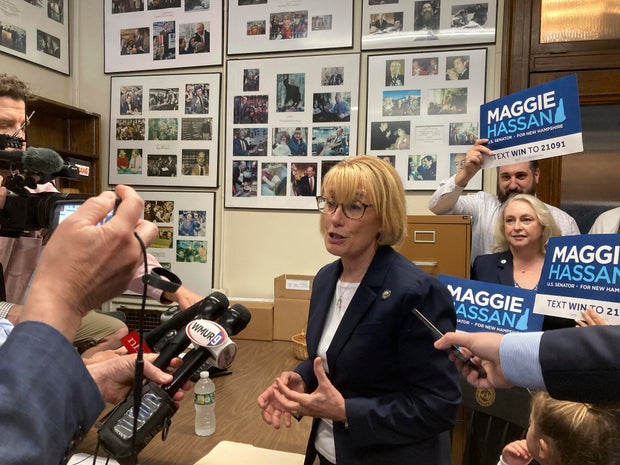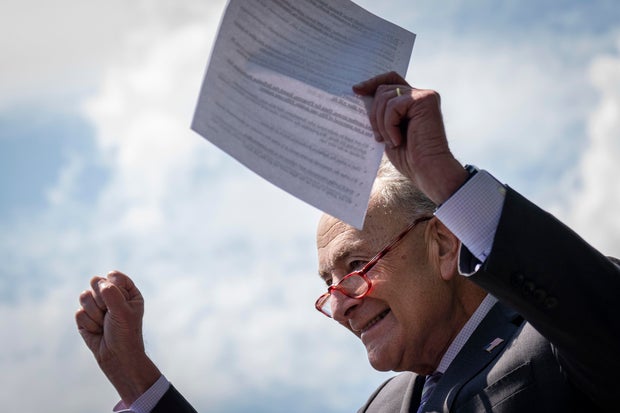"I feel it when I'm out and about": Democrats energized by recent legislative wins
Democrats are celebrating a series of victories as they return to their home states for August recess and begin hitting the campaign trail. With less than 100 days until Election Day, they're eager to tout some recent accomplishments — among them, their long awaited climate and health care legislation, along with several other prominent pieces of legislation that are giving vulnerable Democrats a positive message heading into November.
On Sunday, Senate Democrats passed the Inflation Reduction Act without a single Republican vote. It's the biggest action ever taken by Congress to combat climate change. The measure also empowers Medicare to negotiate drug prices, a longtime Democrat priority, and caps out-of-pocket drug costs for Medicare patients. Some Democrats were already running campaign ads on proposals included in the bill; now, they can point to the legislation as proof they can deliver on their promises.
"I'm thrilled we were finally able to pass this historic, once-in-a-generation investment in our country's future that will lower costs for Georgians, create clean energy jobs and reduce the deficit all at the same time," said Sen. Raphael Warnock, who is up for reelection in the tight race against GOP candidate Herschel Walker.
Following the Senate vote, Warnock touted two specific pieces of legislation he proposed: the Medicare $35 cap on insulin and limiting drug costs for seniors. "I'm not in love with politics, I'm in love with change—and this legislation will make real change in people's lives."
Sen. Mark Kelly of Arizona, who will be facing Republican challenger Blake Masters this fall, also celebrated the passage of the Inflation Reduction Act.
"When I meet with Arizonans and small businesses across our state, the top concern I hear about is rising costs. This is going to lower costs for health care, prescription drugs, and energy while creating great-paying jobs in Arizona," he tweeted.
Sen. Maggie Hassan of New Hampshire called the ability for Medicare to negotiate prescription drug prices a commonsense measure that she's been fighting for after hearing too many stories in her state from those struggling to afford prescriptions. Hassan's Republican challenger will be determined in the state's primary on Sept. 13.
The bill is now headed over to the House where lawmakers are expected to return to Washington to vote for it along party lines on Friday.
The political impact of the act could especially be felt in the House, where Democrats hold a slight majority and are in danger of losing control of the chamber this November. The latest CBS News Battleground Tracker estimates Republicans are likely to retake the House this fall with 230 seats. The race for the Senate appears to be a toss-up.
But the passage of the Inflation Reduction Act is the latest in a recent wave of legislative achievements for Democrats and President Biden in particular, whose approval this summer hit a record low. Over the past two months, lawmakers were able to pass a gun bill with bipartisan support, the CHIPS and Science Act focused on American innovation and competitiveness and the PACT Act — health care legislation for veterans exposed to burn pits.
Democrats are hoping for an uptick in motivation from their base to turn out and vote with the overturning of Roe v. Wade, which ended the nationwide right to an abortion, and are cheered by the recent rejection of an amendment in Kansas that would have allowed the GOP-controlled legislature to further restrict or even ban abortion.
Democratic Rep. Susan Wild of Pennsylvania's 7th District said that while the Supreme's Court decision on Roe v. Wade has been the "catalyst" for a more energized party presence in her district, bills in recent weeks have kept that presence "reverberating."
"I feel it when I'm out and about," she said. "I have noticed a marked increase in, I'm not going to say excitement because people are damn mad about some things, but enthusiasm and making sure that they get out to vote."
At the same time, Democrats facing an onslaught of GOP attacks over soaring inflation are also quick to point out gas prices have been coming down since hitting a peak at more than $5 a gallon in June. Gas is $4.01 a gallon Wednesday, according to AAA.
While congressional Democrats promote their votes on the climate and health care bill, some candidates in battleground states looking to unseat Republican lawmakers are also using the legislation to go after their opponents.
In North Carolina, Democratic Senate candidate and former state Chief Justice Cheri Beasley challenged her opponent, GOP Congressman Ted Budd, by arguing that any lawmaker who is serious about lowering costs would support it.
Congresswoman Val Demings, who is running to unseat Senator Marco Rubio, tweeted the same argument about the legislation and called on Congress to pass more measures like it.
In Pennsylvania, where GOP Sen. Pat Toomey is retiring, Democratic Lt. Gov. and current Senate candidate John Fetterman slammed Republicans for blocking an amendment to the Inflation Reduction Act that would have capped insulin at $35 a month for everyone.
"Dr. Oz and his Republican friends in Washington want you to pay outrageous prices for lifesaving medications, like insulin. No one should have to ration the medication they need to survive," he said.
Both Wild and Democratic Rep. Mike Levin of California have said they'll highlight the provisions about lowering prescription drug costs when talking to voters about how this act will reduce inflation.
Both also said that the act's temporary extension of health insurance subsidies and prevention of a big increase in premium rates this fall, is a great selling point they can promote to voters.
"Forget about the electoral politics for a second — just from a policy perspective, you've got people that are struggling with inflation, gas and groceries are expensive – the last thing you need is for people to get hit with higher healthcare premiums," Levin said.
Democrats' Inflation Reduction Act is a dramatically pared-down version of the $3.5 trillion Build Back Better bill proposed last year that passed in the House. But it has its upsides. The Congressional Budget Office estimates the current bill would actually reduce the deficit by just over $100 billion over the next decade, while new tax enforcement provisions could generate more than $200 billion in new revenue over that same timeframe.
No Senate Republicans voted for the Inflation Reduction Act, and no GOP House members are expected to support it in Friday's vote. Republicans continue to accuse Democrats of reckless spending with their latest legislation — a common theme for Republicans heading into the midterms as inflation hit a more than 40 year high, up 9.1% year-over-year in June.
Democrats can be expected to suggest that their approach is working, though. For the first time in more than two years, inflation was flat last month, and the annual rate eased to 8.5%.
In an interview with CBS News' "Face The Nation" on Sunday, National Republican Senatorial Committee Chair Rick Scott claimed the Inflation Reduction Act should instead be called "the War on Seniors Act." Other GOP lawmakers argue it would increase taxes, despite the president's pledge to not raise taxes on households making less than $400,000.
A poll this week in three swing districts by the American Action Network, a House-GOP backed nonprofit, tested Republican messaging that the bill would add IRS agents, would include an electric car tax credit for "wealthy families" and would cause corporations to cut jobs due to the corporate tax increases. It found that in districts in Michigan, New York and Texas, a majority of respondents would be more likely to vote against a Democrat after hearing their claims.
House Republican leadership have already begun whipping votes against the bill, saying that it has "budgetary gimmicks that don't actually reduce the deficit" and criticizing the provisions on adding IRS agents.
Majority Whip Steve Scalise, who is charged with counting the votes, wrote an email to House Republicans that also ties the Inflation Reduction Act provisions to the FBI's search at Mar-A-Lago on Monday.
"Look no further than the Biden Department of Justice that has become completely weaponized against their political opponents – just imagine what they want to do with 87,000 IRS agents hired by the same administration," it read.
Wild called that approach "an absolutely ridiculous talking point" and said that she had already fielded one question about the IRS during a recent town hall.
The challenge left for Wild, Levin and other Democrats running in competitive races is how to talk about this legislation with voters. Passing a bill doesn't always resonate with voters.
"The way that I talk about bills to people in my district, I always give them the toplines. I give them the really good news. But I try to temper it by just making sure that people understand that progress is slow," Wild said. "But it's all about helping people understand between now and November and beyond, exactly what they need to do to take advantage of these resources that are being sent their way."
"I think the political obituary of House Democrats was written far too prematurely. And let's just see how the next few months go. And let's go out there and campaign," added Levin.






